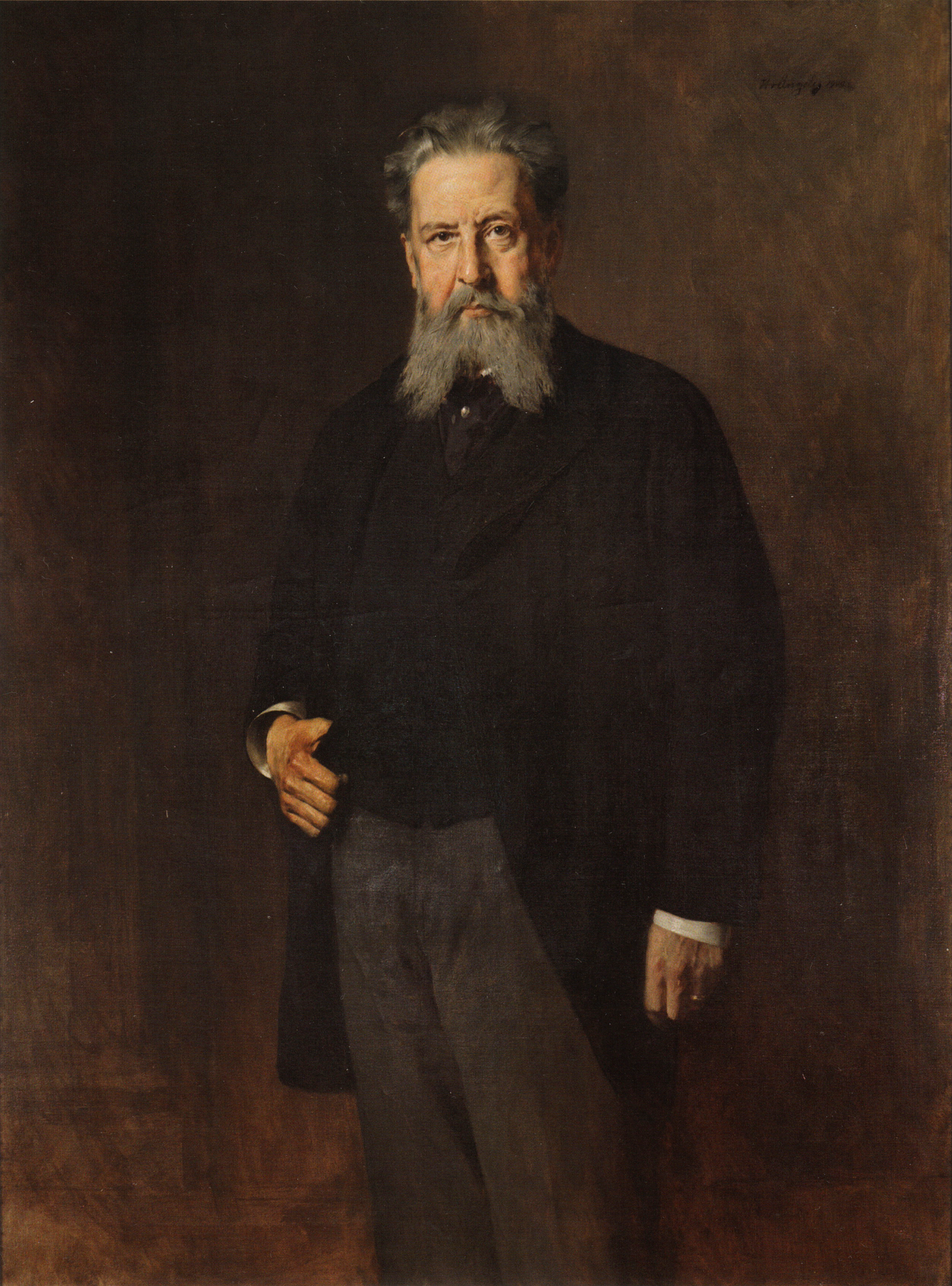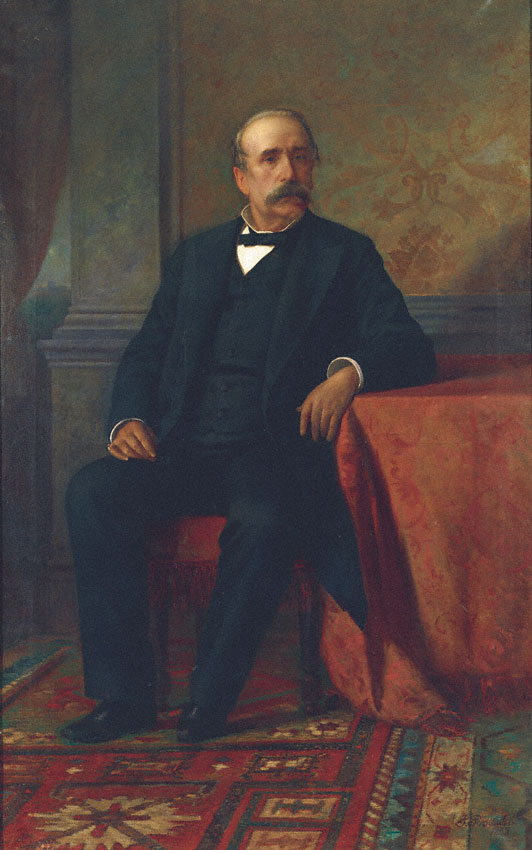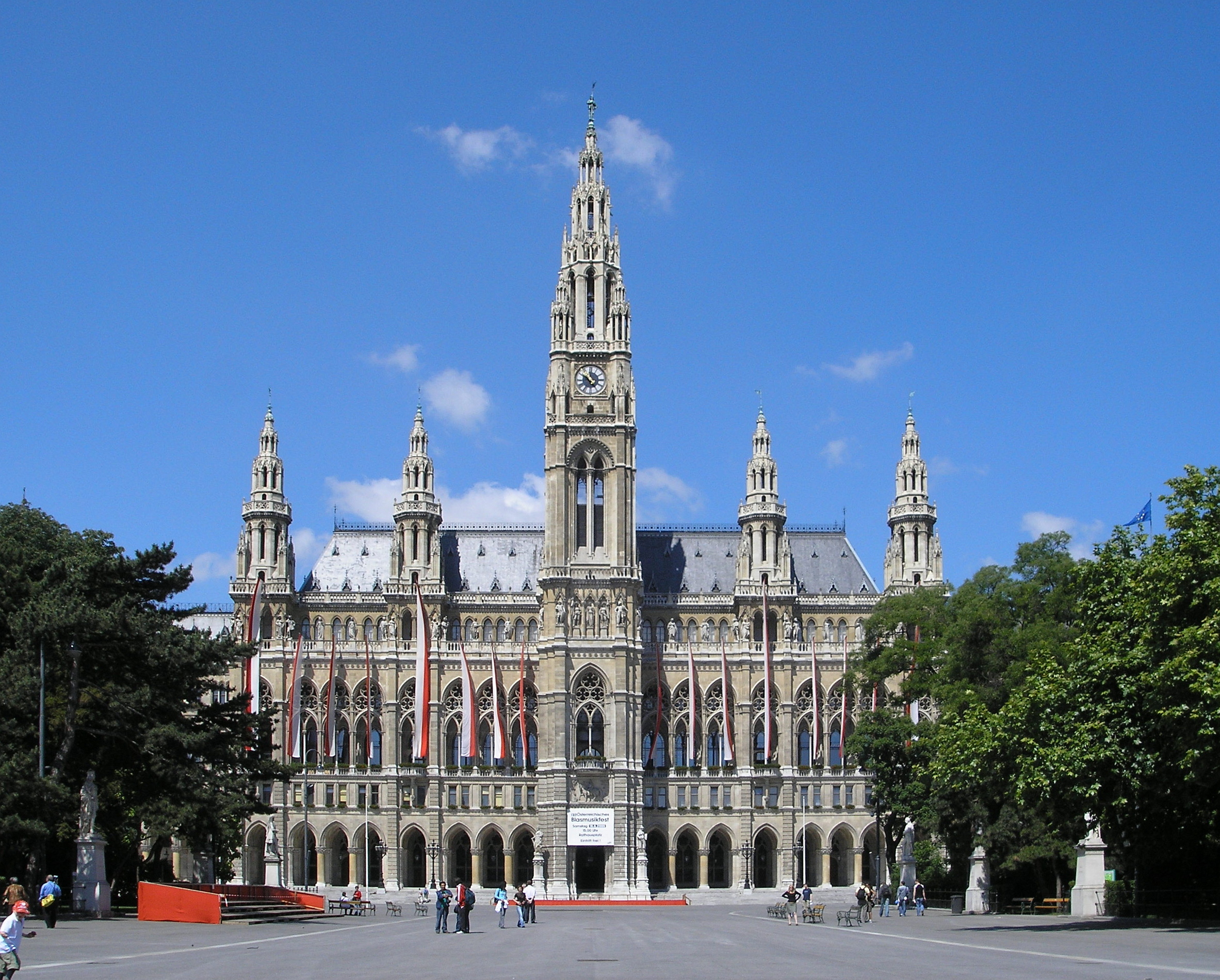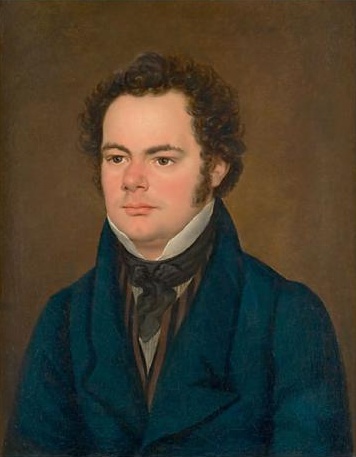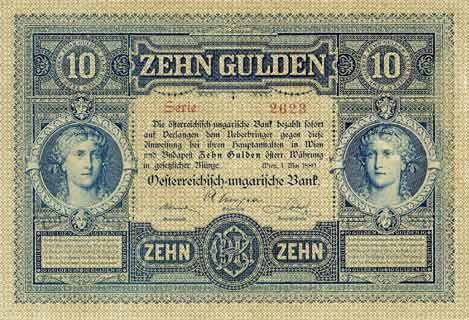|
Nikolaus Dumba
Nikolaus Dumba (Greek: Νικόλαος Δούμπας; 24 July 1830, Vienna – 23 March 1900, Budapest) was an Austrian industrialist and liberal politician. He is considered to have been an important patron of the arts and music and a benefactor of Greece. Biography In 1817, Nikolaus' father Stergios, an immigrant to Vienna from a family from Vlasti of Aromanian-Greek descent, then part of the Ottoman Empire and today a village in Northern Greece, became a merchant. Nikolaus attended the Akademische Gymnasium and spent the revolutionary years of 1847-48 with his brother Michael at the residence of the Austrian Ambassador Anton von Prokesch-Osten in Athens. In 1852, he took a trip to Egypt with the travel writer Alexander Ziegler. He was trained for a commercial career and took over a cotton mill in Tattendorf that had been operated by his cousin Theodore. It had approximately 180 employees and soon became a highly profitable enterprise. This financial base allowed him to ... [...More Info...] [...Related Items...] OR: [Wikipedia] [Google] [Baidu] |
Landtag
A Landtag (State Diet) is generally the legislative assembly or parliament of a federated state or other subnational self-governing entity in German-speaking nations. It is usually a unicameral assembly exercising legislative competence in non-federal matters. The States of Germany and Austria are governed by ''landtage''. In addition, the legislature of the Italian autonomous province of South Tyrol is known in German as a ''landtag''. Historically, states of the German Confederation also established ''landtage''. The Landtag of Liechtenstein is the small nation's unicameral assembly. Name The German word Landtag is composed of the words ''Land'' (state, country or territory) and ''Tag'' (day). The German word ''Tagung'' (meeting) is derived from the German word ''Tag'', as such meetings were held at daylight and sometimes spanned several days. Historic Landtag assemblies States of the Holy Roman Empire In feudal society, the formal class system was reflected in the ... [...More Info...] [...Related Items...] OR: [Wikipedia] [Google] [Baidu] |
Georgios Averoff
George M. Averoff (15 August 1815, Metsovo – 15 July 1899, Alexandria), alternately Jorgos Averof or Georgios Averof (in Greek: Γεώργιος Αβέρωφ), was a businessman and philanthropist. He is one of the great national benefactors of Greece. Born in the town of Metsovo (Epirus, Greece, then Ottoman Empire), Averoff moved to Alexandria while still young. He was known through most of his life for founding numerous schools in both Egypt and Greece. Biography George Averoff was born to an Aromanian family. He moved to Cairo, Egypt, in 1837 to work in a shop run by his brother, Anastasios. Thanks to his bold tactics and business activities he became the biggest merchant in Egypt. At the same time he participated in banking and real estate (buying and leasing land) while, thanks to his many riverboats travelling up and down the Nile, he managed to dominate Egypt's domestic and foreign trade. The Greek historian Antonios Chaldeos, who has written his PhD thesis about t ... [...More Info...] [...Related Items...] OR: [Wikipedia] [Google] [Baidu] |
Serres
Sérres ( el, Σέρρες ) is a city in Macedonia, Greece, capital of the Serres regional unit and second largest city in the region of Central Macedonia, after Thessaloniki. Serres is one of the administrative and economic centers of Northern Greece. The city is situated in a fertile plain at an elevation of about , some northeast of the Strymon river and north-east of Thessaloniki, respectively. Serres' official municipal population was 76,817 in 2011 with the total number of people living in the city and its immediate surroundings estimated at around 100,000. The city is home to the Department of Physical Education and Sport Science of the Aristotle University of Thessaloniki ( el, Τ.Ε.Φ.Α.Α. Σερρών) and the Serres Campus of the International Hellenic University (former " Technological Educational Institute of Central Macedonia"), composed of the Faculty of Engineering, the Faculty of Economics and Management, and the Department of Interior Architecture and ... [...More Info...] [...Related Items...] OR: [Wikipedia] [Google] [Baidu] |
University Of Athens
The National and Kapodistrian University of Athens (NKUA; el, Εθνικό και Καποδιστριακό Πανεπιστήμιο Αθηνών, ''Ethnikó ke Kapodistriakó Panepistímio Athinón''), usually referred to simply as the University of Athens (UoA), is a public university in Athens, Greece."''The EEC’s assessment is that University of Athens is worthy of merit. Educate faculty in the need for QA and evaluation. The successful process of self-evaluation can be replicated. An impartial, genuine, honest, open, effective and constructive strategic planning and communication between the Institution and the state needs to be implemented in order to put in place measures for its longer term viability and tradition of excellence. We conclude by pointing out that the recommendations indicated in our report are intended as ways to improve an already excellent Institution. The culture of excellence in research and teaching that the Institution has established for itself wa ... [...More Info...] [...Related Items...] OR: [Wikipedia] [Google] [Baidu] |
Wienbibliothek Im Rathaus
The Wienbibliothek im Rathaus ( en, Vienna Library in City Hall), formerly known as the ''Wiener Stadt- und Landesbibliothek'' ( en, Vienna City and State Library), is a library and archive containing important documents related to the history of Vienna, Austria. Founded in 1856, the library, which also contains a large collection of local memorabilia, is located in the Rathaus (City Hall) in the Innere Stadt first district of the city, and is the official library of the city and state of Vienna. The Wienbibliothek preserves 500,000 books, 2,000 newspapers and magazines, 300,000 posters, 500,000 autographs, notable bequests and legacies, and one of the most important music collections in the world. Much of the collection can be retrieved through the online user interface available in both German and English. The library is part of the ''Magistrat der Stadt Wien'' (Municipality of Vienna) and supervised by the City Councillor for Culture. History In 1856, the city parliament, led b ... [...More Info...] [...Related Items...] OR: [Wikipedia] [Google] [Baidu] |
Deutsche Messe (Schubert)
The '' (German Mass)'', 872, is a hymn-cycle by Franz Schubert written in 1827. Neither a Mass nor strictly speaking German, it was published in Vienna as what it is: '' (Hymns for the Celebration of the Holy Offering of Mass)''. It sets a sequence of eight non-liturgical German poems by Johann Philipp Neumann, who commissioned Schubert's music, one or more of which could be used separately during Mass. A ninth hymn, given as an appendix, treats the Lord's Prayer, bringing the length to about 35 minutes when the music is performed, as it often now is, as one big concert work. The cycle's original scoring was plain: SATB choir with organ accompaniment. Decades after Schubert died, a grander edition was published: SATB choir, 2 oboes, 2 clarinets, 2 bassoons, 2 horns, 2 trumpets, 3 trombones, timpani and basso continuo. Besides the now standard misnomer ''Deutsche Messe'', the cycle is also sometimes called the ''Wind Mass'' due to the preponderance of wind instruments in this j ... [...More Info...] [...Related Items...] OR: [Wikipedia] [Google] [Baidu] |
Franz Schubert
Franz Peter Schubert (; 31 January 179719 November 1828) was an Austrian composer of the late Classical and early Romantic eras. Despite his short lifetime, Schubert left behind a vast ''oeuvre'', including more than 600 secular vocal works (mainly lieder), seven complete symphonies, sacred music, opera Opera is a form of theatre in which music is a fundamental component and dramatic roles are taken by singers. Such a "work" (the literal translation of the Italian word "opera") is typically a collaboration between a composer and a libr ...s, incidental music, and a large body of piano and chamber music. His major works include "Erlkönig (Schubert), Erlkönig" (D. 328), the Trout Quintet, Piano Quintet in A major, D. 667 (''Trout Quintet''), the Symphony No. 8 (Schubert), Symphony No. 8 in B minor, D. 759 (''Unfinished Symphony''), the Symphony No. 9 (Schubert), "Great" Symphony No. 9 in C major, D. 944, the String Quintet (Schubert), String Quintet (D. 956), ... [...More Info...] [...Related Items...] OR: [Wikipedia] [Google] [Baidu] |
Wiener Männergesang-Verein
The Wiener Männergesang-Verein ("Vienna Men's Choral Society" or "Vienna Male Voice Choir") is a men's choir in Vienna, Austria, founded in 1843. The choir has regularly appeared with the Vienna Philharmonic, and has performed worldwide. Notable composers, particularly Johann Strauss II, have composed music for the choir. History The choir was founded by August Schmidt, on 6 October 1843 in the inn "Zum goldenen Löwen" ("The Golden Lion"). He was a journalist and founder of the ''Allgemeine Wiener Musik-Zeitung''. The choir's first concert took place on 17 December of that year."Wiener Männergesang-Verein" ''Oesterreichisches Musiklexikon Online''. Retrieved 4 February 2021. [...More Info...] [...Related Items...] OR: [Wikipedia] [Google] [Baidu] |
Austro-Hungarian Florin
The florin (german: Gulden, hu, forint, hr, forinta/florin, cs, zlatý) was the currency of the lands of the House of Habsburg between 1754 and 1892 (known as the Austrian Empire from 1804 to 1867 and the Austro-Hungarian Monarchy after 1867), when it was replaced by the Austro-Hungarian crown as part of the introduction of the gold standard. In Austria, the florin was initially divided into 60 kreutzers (german: Kreuzer, hu, krajcar, hr, krajczár cs, krejcar). The currency was decimalized in 1857, using the same names for the unit and subunit. Name The name ''Gulden'' was used on the pre-1867 Austrian banknotes and on the German language side of the post-1867 banknotes. In southern Germany, the word Gulden was the standard word for a major currency unit. After 1867 Austrian coins used the name ''Florin''. "Florin" is derived from the city of Florence, Italy where the first florins were minted, from 1252 to 1533. History The florin (German: ''Gulden'') first emerged as a ... [...More Info...] [...Related Items...] OR: [Wikipedia] [Google] [Baidu] |
Gesellschaft Der Musikfreunde
The Gesellschaft der Musikfreunde in Wien (), also known as the Wiener Musikverein (German for 'Viennese Music Association'), is an Austrian music organization that was founded in 1812 by Joseph Sonnleithner, general secretary of the Court Theatre in Vienna, Austria. Overview Its official charter, drafted in 1814, stated that the purpose of the Gesellschaft was to promote music in all its facets. In early 1818, Franz Schubert was rejected for membership in the Gesellschaft as a professional musician, something that might have furthered his musical career. The Gesellschaft accomplished its goals by sponsoring concerts, founding the Vienna Conservatory in 1819, founding the Wiener Singverein in 1858, constructing the Musikverein building in 1870, and by systematically collecting and archiving noteworthy music-history documents. It is now one of the world's leading music archives. The first music director of the Gesellschaft was Carl Heissler, who was followed by Anton Rubinste ... [...More Info...] [...Related Items...] OR: [Wikipedia] [Google] [Baidu] |
